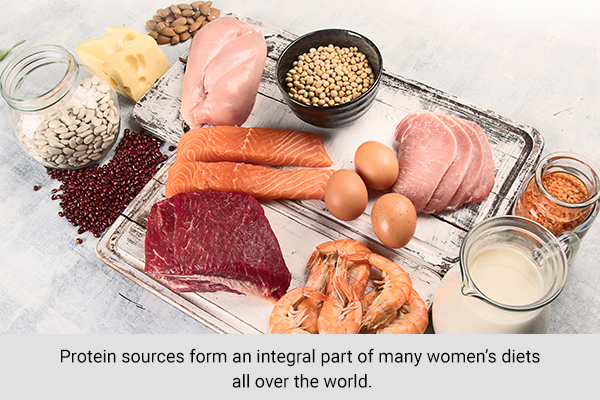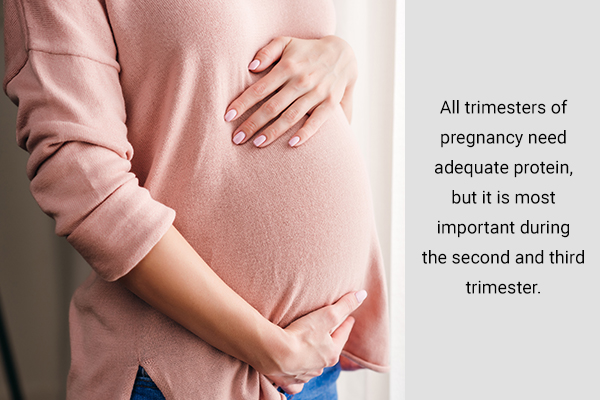In this article:
Protein is one of the three main macronutrients essential to the body along with carbohydrates and fats. Proteins are the main building blocks of the body; they help in creating new cells, hormones, and enzymes.

Proteins are mainly composed of amino acids – essential and nonessential – and you need to make sure you consume food sources that will give you not only total proteins but also essential amino acids (those that cannot be produced in the body).
Nonessential amino acids are synthesized in the body and you don’t need to consume them through the diet. (1)
Proteins are important, but their importance increases manifold during pregnancy. Rapid fetal growth and tremendous physiologic changes in the woman’s body happen right from conception until birth and also after birth during stages of breastfeeding. (2)
Role of Protein in Pregnancy
Protein during pregnancy is necessary for: (3)
- Maintaining the growth of the embryo at a reasonable pace
- Maintaining fluid volume around the fetus
- Expression of genes in the growing baby to prevent birth defects
- Creation of new cells in the mother’s body to sustain the pregnancy
Thus, it is very important for pregnant women to ensure they take in adequate protein.
Studies have found that a lack of protein can increase the risk of abdominal obesity in the fetus along with an increased risk of developing metabolic disorders, hormonal imbalances, and heart disorders later in adulthood. (3)
Protein Requirement During Pregnancy
With each trimester, as the fetus grows and develops more, protein requirements change. There is a 15% rise in protein synthesis in the second trimester and 25% in the third trimester.
According to the recommended dietary allowances by the Food and Nutrition Board, women need to take in 1.1 g of protein per kilogram of body weight each day. However, recent studies have evaluated the amino acid metabolism of pregnant women and determined that, until 16 weeks, they need 1.2 g of protein per kilogram of body weight each day and 1.5 g of protein for each kilogram of body weight in the later weeks of pregnancy. (4)
Protein Sources for Pregnant Women

Protein sources form an integral part of many women’s diets all over the world. So, it is fairly easy and manageable to increase the amount of protein-rich foods to fulfill the increased requirements.
Some protein-rich food sources are: (5)
- Legumes, pulses, and beans
- Animal foods such as meat, milk, and dairy
- Seafood such as fish
- Eggs
- Nuts
Most-Asked Questions
Can I take protein supplements during pregnancy?
Protein powders can be a quick and easy protein source to increase your intake throughout the day. However, most supplements are not regulated by the Food and Drug Association, and it is recommended to be cautious in their use.
In addition, some protein supplements can cause bloating and flatulence, which can cause extreme discomfort for pregnant women.
How do I calculate my protein intake during pregnancy?
To calculate how much protein you need, convert your weight from pounds to kilograms. For example, if you weigh 120 pounds, multiply it by 2.2 to get your weight in kilograms, which is 54 kg.
The next step is to multiply that weight by the protein requirement during pregnancy. If you weigh 54 kg, you should be eating 64.8–97.2 g of protein per day.
In what trimester is protein most important?

All trimesters of pregnancy need adequate protein, but it is most important during the second and third trimesters.
As a vegetarian, how should I fulfill my protein requirement during pregnancy?
Include high-quality protein sources such as legumes, lentils, beans, tofu, milk and dairy products, peas, and nuts. You can also consult your doctor and get a recommendation for a suitable protein supplement.
Final Word
Protein is an essential nutrient and is required to maintain body function. Pregnancy is a period of elevated requirements, and protein is needed to maintain appropriate and healthy fetal development along with preventing birth defects and complications.
- Was this article helpful?
- YES, THANKS!NOT REALLY


